Time to Talk
Immuno-Oncology™
 Immunotherapy has dominated recent U.S. Food and Drug Administration approvals of new treatments in hematology and oncology. Immunotherapy is now given to many patients with cancer, either alone or in combination with chemotherapy. HOPA members identified the need for easy-to-access, patient-focused immuno-oncology education to support the delivery of optimal cancer care.
Immunotherapy has dominated recent U.S. Food and Drug Administration approvals of new treatments in hematology and oncology. Immunotherapy is now given to many patients with cancer, either alone or in combination with chemotherapy. HOPA members identified the need for easy-to-access, patient-focused immuno-oncology education to support the delivery of optimal cancer care.
In response, HOPA partnered with Bristol-Myers Squibb and Regeneron/Sanofi Genzyme to create Time to Talk Immuno-Oncology™, a comprehensive resource for patients receiving immunotherapy.
Immunotherapy is a type of treatment that uses the body's immune system to fight cancer. Several types of immunotherapy exist, among them immune checkpoint inhibitors, cellular therapies (including chimeric antigen receptor T cells or CAR T cells), vaccines, and viruses that can infect and kill tumor cells.
Time to Talk Immuno-Oncology™ contains two tool kits that provide patient-focused education on the most commonly used classes of immunotherapy:
These tools can be printed, filled out digitally, e-mailed, and shared through social media.
Each tool kit includes the following elements:
- An explanation of how the immunotherapy works and what the patient can expect while receiving the treatment
- An overview of possible side effects and tips on toxicity management, symptom tracking, and self-care
- A list of helpful questions that patients can ask their healthcare team about their immunotherapy treatment
- A list of financial resources available to support patients receiving immunotherapy treatment
- A wallet card that provides vital information to other healthcare providers if the patient must be seen in an emergency department or outside the cancer hospital or clinic where the immunotherapy was given
This activity is supported by independent medical education grants from Bristol-Myers Squibb and a partnership between Regeneron Pharmaceuticals, Inc., and Sanofi Genzyme.
For patients:
Immune Checkpoint Inhibitors Tool Kit
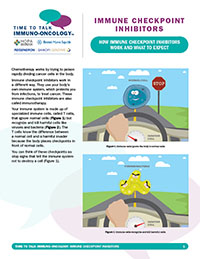 How Immune Checkpoint Inhibitors Work and What to Expect—This tool is a short guide to how the therapy works, with helpful pictures and answers to questions about what you can expect during your treatment.
How Immune Checkpoint Inhibitors Work and What to Expect—This tool is a short guide to how the therapy works, with helpful pictures and answers to questions about what you can expect during your treatment.
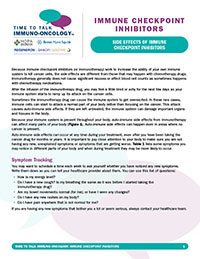 Side Effects of Immune Checkpoint Inhibitors—Like many treatments, immune checkpoint inhibitors can cause unintended side effects in different parts of the body. It's good to be aware of these so you can tell your healthcare provider about any symptoms and get help for managing them. You'll also find useful tips for self-care.
Side Effects of Immune Checkpoint Inhibitors—Like many treatments, immune checkpoint inhibitors can cause unintended side effects in different parts of the body. It's good to be aware of these so you can tell your healthcare provider about any symptoms and get help for managing them. You'll also find useful tips for self-care.
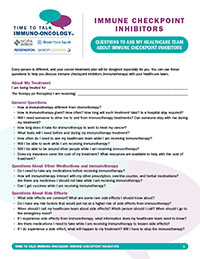 Questions to Ask My Healthcare Team About Immune Checkpoint Inhibitors—This list of questions will help you remember things you want to ask your healthcare team about the treatment and its possible side effects. It includes questions about taking other medications during your treatment.
Questions to Ask My Healthcare Team About Immune Checkpoint Inhibitors—This list of questions will help you remember things you want to ask your healthcare team about the treatment and its possible side effects. It includes questions about taking other medications during your treatment.
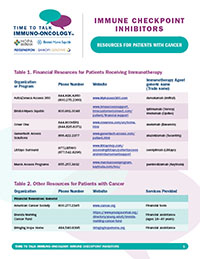 Resources for Patients with Cancer—Many organizations and programs are there to support you and your family during your treatment. Locate sources for financial assistance, assistance with housing and lodging, counseling support, assistance with legal and insurance issues, and other kinds of help.
Resources for Patients with Cancer—Many organizations and programs are there to support you and your family during your treatment. Locate sources for financial assistance, assistance with housing and lodging, counseling support, assistance with legal and insurance issues, and other kinds of help.
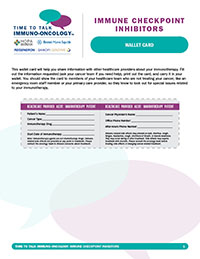 Wallet Card—This card will help you share information about your treatment with other healthcare providers who are not directly involved in treating your cancer.
Wallet Card—This card will help you share information about your treatment with other healthcare providers who are not directly involved in treating your cancer.
Download the Full Immune Checkpoint Inhibitor Tool Kit
Please share your feedback on the tool kit by answering a brief survey.
If you are a patient, complete this survey.
If you are a pharmacist or a healthcare provider, complete this survey.
Cellular Therapy Tool Kit
 What Is CAR T-Cell Therapy?—This tool is a short guide to the steps involved in creating and giving CAR T therapy, with helpful pictures and answers to questions about what you can expect during and after your treatment. It also covers the steps that will be taken to prevent or manage side effects of the treatment.
What Is CAR T-Cell Therapy?—This tool is a short guide to the steps involved in creating and giving CAR T therapy, with helpful pictures and answers to questions about what you can expect during and after your treatment. It also covers the steps that will be taken to prevent or manage side effects of the treatment.
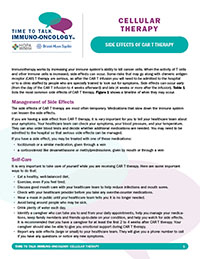 Side Effects of CAR T Therapy— Like many treatments, CAR T therapy can cause unintended side effects in different parts of the body. These can happen both early in your treatment and later on. It's good to be aware of these so you can tell your healthcare provider about any symptoms, especially the most serious ones, and get help for managing them. You'll also find useful tips for self-care.
Side Effects of CAR T Therapy— Like many treatments, CAR T therapy can cause unintended side effects in different parts of the body. These can happen both early in your treatment and later on. It's good to be aware of these so you can tell your healthcare provider about any symptoms, especially the most serious ones, and get help for managing them. You'll also find useful tips for self-care.
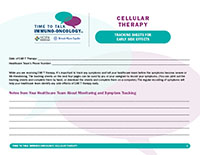 Tracking Sheets for Early Side Effects—It's important for you and your caregiver to track your symptoms and tell your healthcare team about them before they become severe or life-threatening. Three tracking sheets are provided: for symptoms related to cytokine release syndrome (high fevers and low blood pressure); symptoms related to the brain, spinal cord, and nerves (neurologic side effects); and other symptoms. (You can print out the tracking sheets and complete them by hand, or download the sheets and complete them on a computer.)
Tracking Sheets for Early Side Effects—It's important for you and your caregiver to track your symptoms and tell your healthcare team about them before they become severe or life-threatening. Three tracking sheets are provided: for symptoms related to cytokine release syndrome (high fevers and low blood pressure); symptoms related to the brain, spinal cord, and nerves (neurologic side effects); and other symptoms. (You can print out the tracking sheets and complete them by hand, or download the sheets and complete them on a computer.)
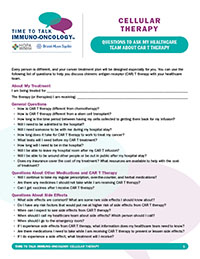 Questions to Ask My Healthcare Team About CAR T Therapy—This list of questions will help you remember things you want to ask your healthcare team about the treatment and its possible side effects. It includes questions about taking other medications during and after your treatment.
Questions to Ask My Healthcare Team About CAR T Therapy—This list of questions will help you remember things you want to ask your healthcare team about the treatment and its possible side effects. It includes questions about taking other medications during and after your treatment.
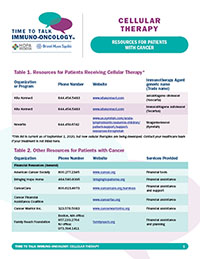 Resources for Patients with Cancer—Many organizations and programs are there to support you and your family during your treatment. Locate sources for financial assistance; assistance with housing, lodging, and air travel; counseling support; assistance with legal and insurance issues; and other kinds of help.
Resources for Patients with Cancer—Many organizations and programs are there to support you and your family during your treatment. Locate sources for financial assistance; assistance with housing, lodging, and air travel; counseling support; assistance with legal and insurance issues; and other kinds of help.
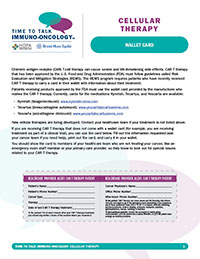 Wallet card—Use the card provided (or one available from the drug manufacturer) to help you share information about your treatment with other healthcare providers who are not directly involved in treating your cancer.
Wallet card—Use the card provided (or one available from the drug manufacturer) to help you share information about your treatment with other healthcare providers who are not directly involved in treating your cancer.
Download the Full Cellular Therapy Tool Kit
Please share your feedback on the tool kit by answering a brief survey.
If you are a patient, complete this survey.
If you are a pharmacist or a healthcare provider, complete this survey.

